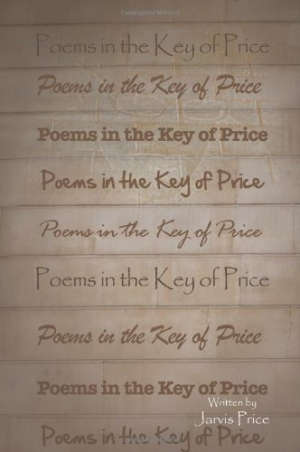Poems in the Key of Price
Jarvis Price’s debut collection, Poems in the Key of Price, focuses on a man in search of consolation and reconciliation. A poet of imploring messages whose subjects range from romantic and filial love to the endurance of Christian faith as a bulwark against the problems of urban life, he often employs transparent sentiments, idiomatic phrases, and spare, familiar images, including the ocean, stars, sunrise, seasons, and roses. He uses language as a form of therapeutic expression.
Each poem, one to two pages in length, is centered on the page and unfolds in plainspoken lines (with occasional misspellings and misplaced punctuation) that build toward facile conclusions, from the assurance of “All you have to do is Trust” to the optimistic declaration, “Until then, gaze closely amongst the clouds as you’ll see me on a / ladder reaching for the stars.” Among such repetitive and common references, more precise moments stand out: The allusion to Medgar Evers and Byron De La Beckwith and the “sizzling sound of hair burned from the hot-combs / in front of Granny’s oven,” for instance, contextualize an otherwise everyman persona within an African-American community. It is here that the book demonstrates potential to move toward richer material.
Price, however, seldom seizes such moments to venture beyond observation. A poem on black history decries the ease with which earlier political struggles have been forgotten in place of contemporary cultural icons, but it does not gather enough momentum to build toward a powerful litany: “Is an image of Martin and Malcolm with Obama and ‘Lil Somebody’ enough for an awakening? / Please people remember. / Yesterday”). “The Children,” a lamentation on violence, relies on platitudes, as when Price writes that, “I believe that time invested is never time wasted upon the children.” “Mr. Politician,” a call against neglect, invokes current events—“A child was shot in the back for being black and a theatre is known / for its massacre”—without venturing beyond the initial outrage. Still, Price’s willingness to engage with challenging topics lends weight to the collection and moves the use of “I” beyond the limitations of self-reflection.
Though Poems in the Key of Price is marked by a novice’s enthusiasm and minimal craft, Jarvis achieves some surprising moments that hint at future promise. In what is perhaps the strongest, most musical, and evocative line of the collection, “All the honey in the world is nothing without the confirmation of the bees,” he reveals the ambiguous mystery that demonstrates his potential for fresher, livelier work.
Reviewed by
Karen Rigby
Disclosure: This article is not an endorsement, but a review. The publisher of this book provided free copies of the book and paid a small fee to have their book reviewed by a professional reviewer. Foreword Reviews and Clarion Reviews make no guarantee that the publisher will receive a positive review. Foreword Magazine, Inc. is disclosing this in accordance with the Federal Trade Commission’s 16 CFR, Part 255.

